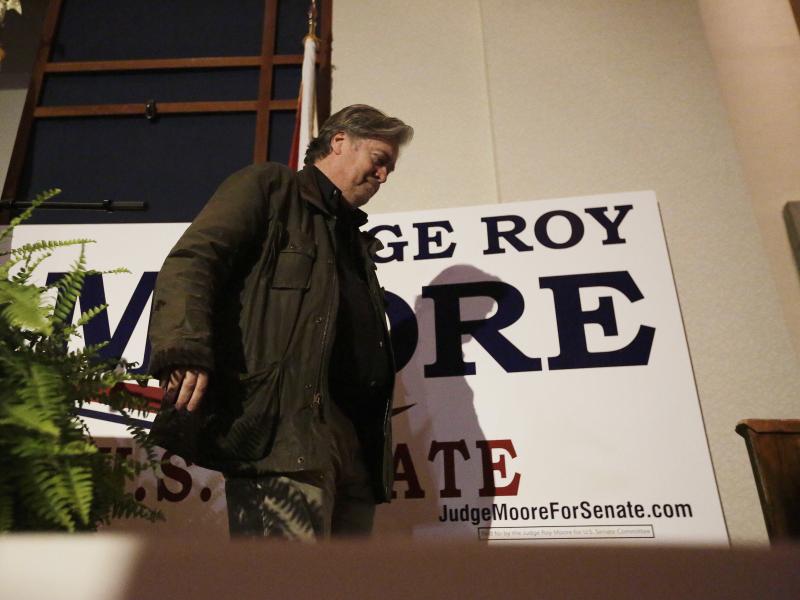
When I heard that former Trump strategist Steve Bannon wanted hard-core conservatives to unseat Republican senators, including John Barrasso of Wyoming, Deb Fischer of Nebraska, and Roger Wicker of Mississippi, I was perplexed. Sure, there are some fairly moderate Senate Republicans—among them, Susan Collins of Maine, Shelley Moore Capito of West Virginia, and Lisa Murkowski of Alaska. But Barrasso, Fischer, and Wicker?
As best I can tell, about the only time the three have voted against President Trump was on the Russian-sanctions bill, joining a 98-2 majority. So what earned them a place in Bannon’s demonology? It’s not as if the three run around Capitol Hill saying crazy stuff or foaming at the mouth. Ted Cruz of Texas appears to have escaped the Bannon hit list by hiring Trump alums to help his 2018 Senate reelection campaign.
Having some moderate members helps the GOP curb its ideological excesses, just as having some moderate Democrats keeps their party from going too far the other way. It obviously doesn’t always work but it can help. But Barrasso, Fischer, and Wicker?
Columnist Mark Shields likes to say that he would rather be a member of a church trying to attract converts than one bent on driving out heretics. Show me an ideologically diverse party and I’ll show you one that is either in the majority or can be. Show me an ideologically cohesive party and I’ll show you one that either is in the minority or soon will be. But if Democrats fare well in next year’s midterm elections, it is not likely to be because they are ideologically more diverse than Republicans. More likely, it would be because they aren’t Republicans and don’t have any truck with President Trump.
Another Republican Senate incumbent up next year is Jeff Flake. The Arizonan is no moderate, and isn’t even really a maverick like his colleague John McCain. But Flake is on the verge of being burned at the stake for criticizing some of Trump’s excesses in his book, Conscience of a Conservative: A Rejection of Destructive Politics and a Return to Principle. In essence, Flake wrote that the emperor has no clothes, that Trump was no conservative. Right now many political soothsayers doubt that Flake could survive a primary challenge from former state Sen. Kelli Ward, McCain’s 2016 primary opponent. And if Flake somehow prevailed in the primary, he’d be so bloody and bruised that he would have an awfully tough time getting reelected.
So how will these early soundings play out in the midterm elections? It would seem logical to divide Republicans who end up with serious challenges from Trumpeteers into two groups: those in states where no Democrat, or at least no identifiable Democrat, can present a credible challenge to a badly damaged incumbent, and those states where at least one Democrat could conceivably win.
From this vantage point, it isn’t clear how any Democrats could win a general election in Fischer’s Nebraska or Barrasso’s Wyoming. In Mississippi, Wicker seems to have already drawn a Trumpeteer challenger in the GOP primary, state Sen. Chris McDaniel. In 2014, McDaniel edged out Thad Cochran in the primary but didn’t get 50 percent of the vote, forcing a runoff won 51-49 percent by the elderly incumbent who attracted African-Americans and other Democrats who did not vote in the Democratic primary. The Mississippi Democratic Party is in tatters, but it does have one candidate who, if he ran, would have a decent chance of beating McDaniel. State Attorney General Jim Hood was elected in 2003 and has been reelected three times since, with 60 percent of the vote in 2007, 61 percent in 2011, and 55 percent in 2015. Hood is thought to be eyeing a gubernatorial race in 2019 but would get a free shot at running for the Senate next year without having to give up his post. That’s keeping Republicans up at night.
In 2010, a few weeks before Democrats lost control of the House in President Obama’s first midterm elections, I ran into then-House Minority Leader John Boehner at a reception. Boehner saw me and said barely above a whisper, “We’re going to win this thing,” then paused and added, “aren’t we?” My response was, “Yes, I think you are.” Boehner, smiling, wine glass in hand, replied, “Damnedest thing I ever saw.” Democrats were making so many unforced errors that all Republicans had to do was to merely stay out of the way and let them finish the job. It’s premature to say that’s what is happening to the GOP now or could happen next year, but the political terrain has a familiar feel to those of us who have watched midterm elections over the years. A key question is whether Democrats can stay out of the way and not interfere with the Republicans’ circular firing squad.
This story was originally published on nationaljournal.com on October 24, 2017
Image: AP Photo/Brynn Anderson



Subscribe Today
Our subscribers have first access to individual race pages for each House, Senate and Governors race, which will include race ratings (each race is rated on a seven-point scale) and a narrative analysis pertaining to that race.